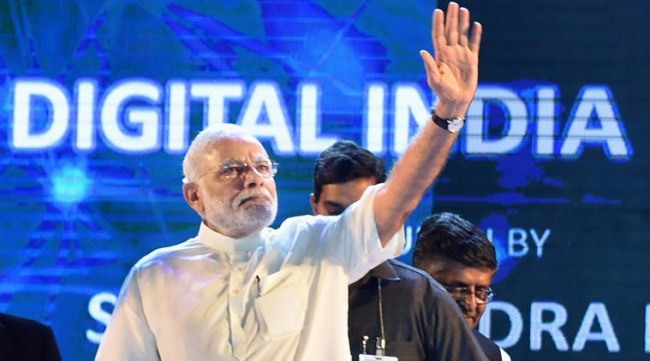Opinion Fifth column: Digital dreaming
What the Prime Minister appears unaware of is that despite his appeals, foreign investors are not exactly lining up at India’s gates to invest in new projects. Could this be because the small things that make a huge difference have not yet changed?
 Transactions related to e-governance projects have almost doubled in 2015, owing to the Digital India Programme.
Transactions related to e-governance projects have almost doubled in 2015, owing to the Digital India Programme.  The Prime Minister’s obsession with dragging India, kicking and screaming, into the digital age is admirable. But, if he knew how badly digital works in the departments of his government, it might shock him.
The Prime Minister’s obsession with dragging India, kicking and screaming, into the digital age is admirable. But, if he knew how badly digital works in the departments of his government, it might shock him.
Narendra Modi has shown more impatience to use technology to transform India than any other prime minister. In his passionate impatience he seems not to have noticed that most Indian officials do not share his passion. Technology reduces their powers to harass and control, and unless they do this, how can they qualify as ‘burra sahibs’. Nor has he noticed the evil tricks these officials devise to thwart his digital dreams. Last week, at that conference of global entrepreneurs in Hyderabad, the Prime Minister repeated for the umpteenth time that he wants foreign businesses to come ‘Make in India’. A day later he took time off from campaigning in Gujarat to attend a conference in Delhi where he boasted that his government had helped India climb 30 notches on the chart that measures countries on the ease of doing business.
What the Prime Minister appears unaware of is that despite his appeals, foreign investors are not exactly lining up at India’s gates to invest in new projects. Could this be because the small things that make a huge difference have not yet changed? We now have magnificent, modern airports in Delhi and Mumbai (where once were grubby sheds) but the officials charged with passport control and Customs remain stuck in those socialist sheds. As someone who campaigned tirelessly in this column for the abolition of arrival forms for Indian citizens, I was astounded at Mumbai airport last week to see an official treat boarding cards as a replacement.
My travelling companion had lost his boarding card but had a valid Indian passport and details of the flight on which he travelled. The stamp in his passport revealed the city he travelled from. This was not good enough for the immigration official. He demanded proof in the form of a boarding card. So despite the lateness of the night, despite weariness from hours of travel, we were forced to protest. A standoff was the result until senior officials intervened.
Now even more travel weary, we were forced to observe another uniquely Indian procedure. Instead of moving on to collect our baggage, we lined up to have our passports inspected by an official who wanted to ensure that the earlier official had stamped our passports. After we collected our baggage, we queued once more to have our hand luggage x-rayed. Except perhaps at Pyongyang International Airport, weary travellers do not need to go through these checks anywhere. When I finally emerged into Mumbai’s steamy, smelly air, I found myself thinking that if I were a prospective foreign investor or a tourist, I would run for my life.
The flaws of Indian officialdom are a serious problem as we saw recently when little Santoshi died of starvation in that Jharkhand village. Her mother said the little girl begged for rice before she died but for six months there had not been any supplied to this wretchedly poor family because the village ration shop demanded an Aadhaar card. As always in such cases, officials denied that Santoshi had died of starvation. Then, because media attention was intense, Santoshi’s hut was quickly filled up with bags of rice, edible oil and other rations. The media soon lost interest, and so we do not know how many other children are suffering because biometric technology is dodgy in rural India.
The Prime Minister’s obsession with dragging India, kicking and screaming, into the digital age is admirable. But, if he knew how badly digital works in the departments of his government, it might shock him. I have foreign friends who have changed their mind about travelling to India because getting a visa online (or otherwise) is so difficult. Online the website crashes with annoying regularity, and on earth the officials who man our consulates and embassies are of the usual obdurate, unfriendly kind. Mr Modi is the first Prime Minister who has noticed that foreign tourists could become a huge source of foreign exchange, but the whole of India continues to get less than half the tourists that Bangkok gets. With much, much more to offer, India got less than 9 million foreign travellers this year compared to more than 20 million who visited Bangkok.
If the Prime Minister snaps out of the digital world that so enthralls him, he will find that the reason why he is being routinely taunted by Congress leaders for not bringing ‘achche din’ is because of the resistance of officialdom to ‘parivartan’. Recent polls show that his personal popularity remains almost undiminished, but lower down the ranks there is a general feeling that ‘minimum government’ has not even begun to happen. This is because far too many officials remain deployed in performing tasks that have become meaningless in our digital age. He needs to ask why this is so, despite nearly all our major states being governed by his team of chief ministers.
Follow Tavleen Singh on Twitter @ tavleen_singh





